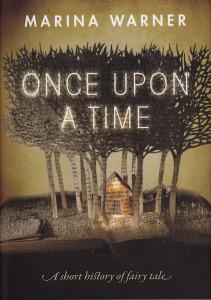 I knew of fairy tales as a child, but I recall them mostly being mediated through the Wonderful World of Disney on Sunday nights, just before bath time. I don’t recall experiencing them in written form, and although I may have experienced them as narrated versions from time to time, my memory is mostly of the animated variety. I’ve been reading about fairy tales lately since folklore clearly relates to many sacred narratives. My most recent book on the subject is Marina Warner’s Once Upon a Time: A Short History of the Fairy Tale. Like most of Warner’s books, this is a unique telling, one which takes into account modern and some post-modern concerns. Addressing what fairy tales tell us about the supernatural, gender, psychology, and growing up, this is a little book with big thoughts.
I knew of fairy tales as a child, but I recall them mostly being mediated through the Wonderful World of Disney on Sunday nights, just before bath time. I don’t recall experiencing them in written form, and although I may have experienced them as narrated versions from time to time, my memory is mostly of the animated variety. I’ve been reading about fairy tales lately since folklore clearly relates to many sacred narratives. My most recent book on the subject is Marina Warner’s Once Upon a Time: A Short History of the Fairy Tale. Like most of Warner’s books, this is a unique telling, one which takes into account modern and some post-modern concerns. Addressing what fairy tales tell us about the supernatural, gender, psychology, and growing up, this is a little book with big thoughts.
Unlike the polished literature of the elites, fairy tales come from the folk, the common person. In this sense they are often truer than the establishment version of things. Life can be violent and magical, and nobody raises an eyebrow when something supernatural occurs. These tales often contain uncomfortable truths. Fairy tales may help children to cope with eventualities, but they also unsettle along the way. Rare is the tale where someone doesn’t die before it’s all over. Like many disenchanted adults who’ve discovered the promises society makes to be false and hollow, I find returning to fairy tales as an adult somewhat therapeutic. Long ago in a land far away often sounds much better than here and now. Nor is it pure escapism.
As Warner points out in the very final thoughts of the book, fairy tales have come to be treated as scriptures. Like scriptures, they turn into myths. Myths may be retold, deconstructed, reassembled, and applied to many situations to inform us of the human thing to do. We sell ourselves short by not recognizing the other scriptures that wisdom has provided down the ages. While most of the folk wisdom we have preserved in the canon of fairy tales don’t go back to the Bible, they do retread some of the same territory. By calling some of it scripture and other secular, we might miss that very many of the truths are similar indeed. The assumption that growing up means leaving truths of childhood behind may, on occasion, bear reexamination. If we look closely at our fairy tales we may discover that we should keep them close at hand, no matter what our age.
